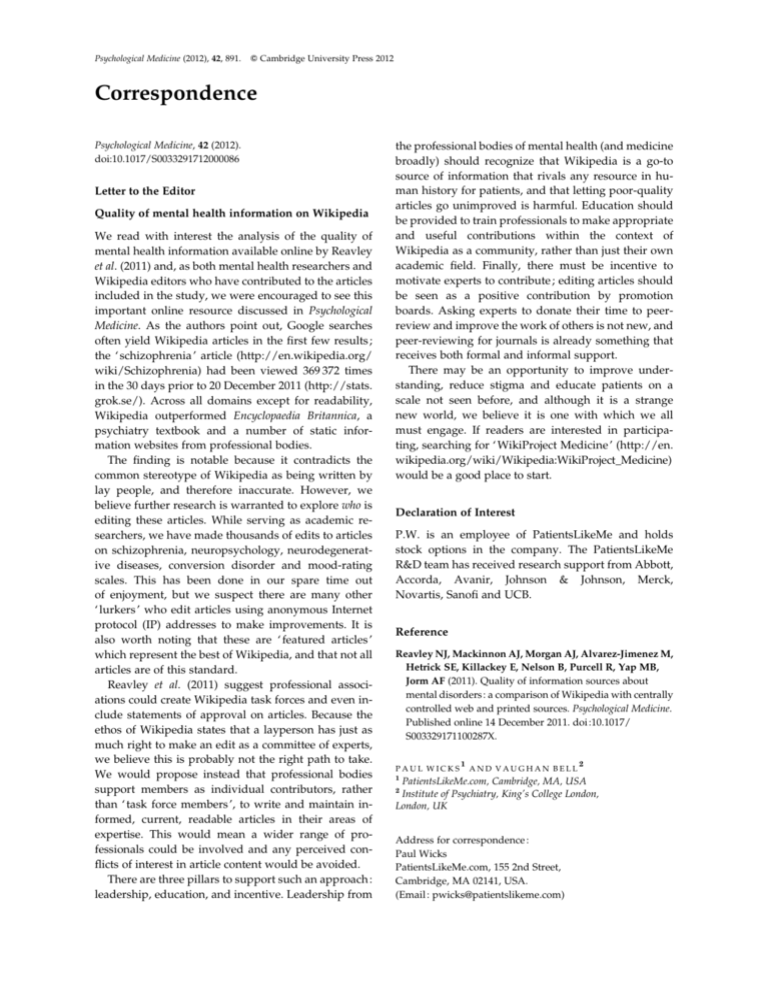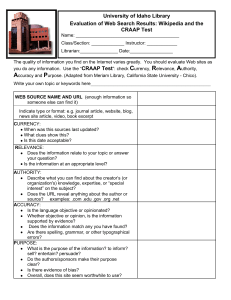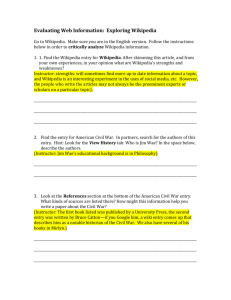Letter to the Editor: Quality of mental health information on Wikipedia
advertisement

Psychological Medicine (2012), 42, 891. f Cambridge University Press 2012 Correspondence Psychological Medicine, 42 (2012). doi:10.1017/S0033291712000086 Letter to the Editor Quality of mental health information on Wikipedia We read with interest the analysis of the quality of mental health information available online by Reavley et al. (2011) and, as both mental health researchers and Wikipedia editors who have contributed to the articles included in the study, we were encouraged to see this important online resource discussed in Psychological Medicine. As the authors point out, Google searches often yield Wikipedia articles in the first few results ; the ‘ schizophrenia ’ article (http://en.wikipedia.org/ wiki/Schizophrenia) had been viewed 369 372 times in the 30 days prior to 20 December 2011 (http://stats. grok.se/). Across all domains except for readability, Wikipedia outperformed Encyclopaedia Britannica, a psychiatry textbook and a number of static information websites from professional bodies. The finding is notable because it contradicts the common stereotype of Wikipedia as being written by lay people, and therefore inaccurate. However, we believe further research is warranted to explore who is editing these articles. While serving as academic researchers, we have made thousands of edits to articles on schizophrenia, neuropsychology, neurodegenerative diseases, conversion disorder and mood-rating scales. This has been done in our spare time out of enjoyment, but we suspect there are many other ‘ lurkers ’ who edit articles using anonymous Internet protocol (IP) addresses to make improvements. It is also worth noting that these are ‘ featured articles ’ which represent the best of Wikipedia, and that not all articles are of this standard. Reavley et al. (2011) suggest professional associations could create Wikipedia task forces and even include statements of approval on articles. Because the ethos of Wikipedia states that a layperson has just as much right to make an edit as a committee of experts, we believe this is probably not the right path to take. We would propose instead that professional bodies support members as individual contributors, rather than ‘ task force members ’, to write and maintain informed, current, readable articles in their areas of expertise. This would mean a wider range of professionals could be involved and any perceived conflicts of interest in article content would be avoided. There are three pillars to support such an approach : leadership, education, and incentive. Leadership from the professional bodies of mental health (and medicine broadly) should recognize that Wikipedia is a go-to source of information that rivals any resource in human history for patients, and that letting poor-quality articles go unimproved is harmful. Education should be provided to train professionals to make appropriate and useful contributions within the context of Wikipedia as a community, rather than just their own academic field. Finally, there must be incentive to motivate experts to contribute ; editing articles should be seen as a positive contribution by promotion boards. Asking experts to donate their time to peerreview and improve the work of others is not new, and peer-reviewing for journals is already something that receives both formal and informal support. There may be an opportunity to improve understanding, reduce stigma and educate patients on a scale not seen before, and although it is a strange new world, we believe it is one with which we all must engage. If readers are interested in participating, searching for ‘ WikiProject Medicine ’ (http://en. wikipedia.org/wiki/Wikipedia:WikiProject_Medicine) would be a good place to start. Declaration of Interest P.W. is an employee of PatientsLikeMe and holds stock options in the company. The PatientsLikeMe R&D team has received research support from Abbott, Accorda, Avanir, Johnson & Johnson, Merck, Novartis, Sanofi and UCB. Reference Reavley NJ, Mackinnon AJ, Morgan AJ, Alvarez-Jimenez M, Hetrick SE, Killackey E, Nelson B, Purcell R, Yap MB, Jorm AF (2011). Quality of information sources about mental disorders : a comparison of Wikipedia with centrally controlled web and printed sources. Psychological Medicine. Published online 14 December 2011. doi :10.1017/ S003329171100287X. PAUL WICKS 1 AND VAUGHAN BELL 1 2 PatientsLikeMe.com, Cambridge, MA, USA 2 Institute of Psychiatry, King’s College London, London, UK Address for correspondence : Paul Wicks PatientsLikeMe.com, 155 2nd Street, Cambridge, MA 02141, USA. (Email : pwicks@patientslikeme.com)




